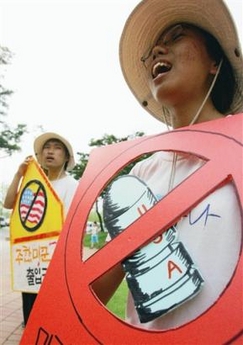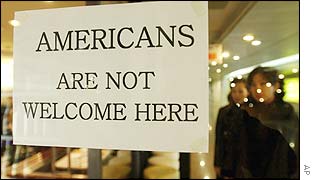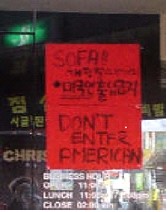The HRC Responds, Part II
The other part of my e-mail to the Human Rights Committee was a complaint. You’d think it subject matter would have been obvious enough from the subject line:
Complaint–discrimination based on race and national origin
Here, in relevant part, is what it said:
I am [my bad; should have said was] an American soldier who spent four years defending your human rights. Today, I am an activist for withdrawing US forces from Korea, and for promoting human rights for North Koreans. Why? Because in Korea, this kind of discrimination seems to be perfectly legal:
I linked to this post, which said, in relevant part:
Below: August 2005. South Korean demonstrators show their appreciation for their prosperity and freedom of speech by standing at the entrance to a soccer match holding signs that say, “American soldiers not admitted.” The U.S. team was not playing.

Isolated incident? No.


Barring American soldiers from Korean businesses is quite common, as I can attest from personal experience, but permitting discrimination at a public event is a new low. Does Congress know about this? Why does the South Korean government allow this?
This kind of discrimination goes on with no apparent objection from the Korean government, as I also observed during my four-year tour in Korea, from 1998 to 2002. To be completely clear, I said:
Please consider this to be the submission of a formal third-party complaint that private parties regularly engage in discrimination against US soldiers on the basis of race and national origin, including at a public sporting event in Taegu last week, and that Korean authorities knowingly tolerate this.
Here is the HRC’s response to that part of the complaint:
1. Hello, This is a Human right consult center of National Human Right Associate.
2. I think your inquiry is that Korean government’s ignorance about racism and our commitee’s opinion about North Korean hunman rights.
3. Our committee deals with all the case according National human right act law.
4. So if you want to commit your complain about racism than you can use our instructions which I attached below.
This is where things get curiously circular, because the HRC only takes complaints from foreigners who are “resident in Korea” For confirmation of identity, the site also requires a Korean resident ID number and the name of the complainant. Anonymous complaints are not accepted. This means complaining to the HRC is not an option for U.S. service members in Korea. First, they don’t have Korean resident ID numbers. Second, the military rightfully frowns on its personnel involving themselves in domestic politics.
That means that American soldiers need the help of their friends who are residents of Korea. They need not be Americans. They can be Koreans, Austalians, Canadians, Brits, or anyone who appreciates that the members of the U.S. military don’t make American foreign policy and do the hard, hot, cold, muddy work of protecting Korea from Kim Jong Il. Policy disagreements do not justify giving Private Snuffy the Jim Crow treatment. These are not the values that those soldiers, airmen, Marines, and sailors are there to defend.
American service members also need the help of the American people, regardless of where they live. Americans’ e-mails can exert great pressure on the Korean government to ban discrimination against our service members in Korea. This is not an unreasonable request, because Korea is neither an emerging democracy, a nation at war (in a real sense, at least), or a third-world nation. This is simply a ways we can support our service members while they’re assigned to protect another nation’s freedom and prosperity, and ultimately, our own.
Here are the sites and e-mail addresses to which you may send your complaint:
- S. Korean Human Rights Commission: nhrc@humanrights.go.kr
- S. Korean Embassy, Washington: political_usa@mofat.go.kr
- U.S. Congress (find your rep site)
Your letter need not be long. Just say, “I support a ban on discrimination against American service members in Korea,” and be sure to include the URL of this page. That’s all. And please be polite.
Thank you.